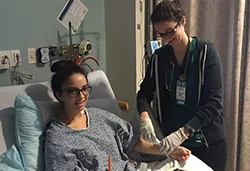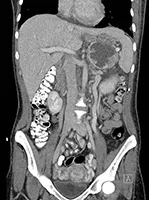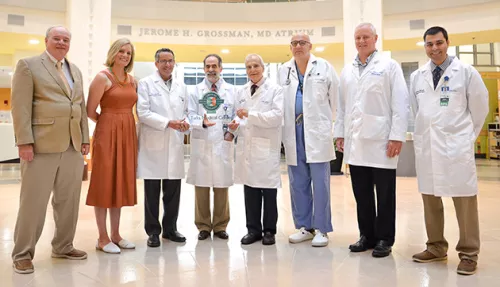
For most of her life, Elizabeth Craioveanu, from Hooksett, NH, couldn’t remember ever feeling well for any extended period of time. She was sick a lot as a child and as she grew older, her symptoms expanded to include anxiety, weight loss, nausea, headaches and cold sweats.
Elizabeth gave birth to a son at age 18, but by her early 20s, she was barely able to care for him. She was going to her local Emergency Department once or twice per week, on average, with abnormally high blood pressure and heart rate. She underwent a bevy of tests, but they were all negative – no one was able to figure out what was wrong with her.
“I was miserable, sick all the time, unable to work or even function daily,” she said. “I felt like I was dying all the time.”
One day, in late 2014, Elizabeth woke up at 4:30 am with her bed drenched in sweat. Her father took her to the Emergency Department of her local hospital. At first, they thought she was experiencing a drug overdose, but soon realized they were mistaken. Shortly after she was intubated, Elizabeth suffered cardiac arrest, requiring CPR and an eventual airlift to Dartmouth-Hitchcock Medical Center. Imaging there revealed a mass on one of her adrenal glands. She was airlifted again, this time to Tufts Medical Center in Boston. The decision very likely saved her life.
When Elizabeth arrived at the Tufts MC Emergency Department, she was suffering from stress-induced cardiomyopathy and was in heart failure. Her heart’s ejection fraction was 10%. Ronald Lechan, MD, PhD, Neuro-Endocrinologist and Co-Director of the Hypothalamic and Pituitary Disease Center at Tufts Medical Center, came to see her in the ED. He had seen this collection of symptoms before and immediately knew what was causing them – a rare tumor called pheochromocytoma.

Pheochromocytoma is a neuroendocrine tumor that develops in cells in the center of the adrenal gland, called the adrenal medulla, which controls the release of catecholamines -- hormones, including adrenaline, that are produced in response to physical or emotional stress. Pheochromocytoma causes the overproduction of these catecholamines, which often results in persistent or episodic high blood pressure, headache, anxiety, sweating and other physical and physiological symptoms. If left untreated, pheochromocytoma can result in heart attack, stroke, pulmonary edema and even sudden death.
While often curable if diagnosed and properly treated, patients with pheochromocytoma are often misdiagnosed, since the symptoms are commonly associated with cardiac or psychiatric problems. While quite rare – pheochromocytomas are found in about 8 people per million – Dr. Lechan estimates that only about half of all cases are identified during a person’s lifetime.
“It is probably a lot more common than we realize because it is so underdiagnosed,” he said. “You might get through life without diagnosis or treatment, but this tumor is a ticking time bomb.”
Probably the most famous case of an undiagnosed pheochromocytoma was in President Dwight D. Eisenhower. The 34th President of the United States suffered multiple strokes and other health issues, but despite having access to the best doctors, he wasn’t diagnosed until autopsy.
“A physician has to have a broad knowledge base and a high index of suspicion to accurately diagnose pheochromocytoma, particularly if the symptoms are seen in young people,” said Dr. Lechan. “Primary care doctors, cardiologists, emergency medicine physicians and nephrologists should all be aware of the signs and symptoms of pheochromocytoma.”
For nearly 50 years, a team of highly skilled Tufts Medical Center physicians from a variety of specialties has set itself apart in the diagnosis and treatment of pheochromocytoma. Dr. Lechan, himself, has cared for upwards of 120 patients with these tumors, together with cardiologist and Chief Physician Executive of the CardioVascular Center Marvin Konstam, MD; the surgical team, including former Chair of the Department of Surgery and current President and CEO of Tufts Medical Center Michael Tarnoff, MD, Director of the Peritoneal Surface Malignancy Program Martin Goodman, MD, Neurosurgeon-in-Chief Carl Heilman, MD and Interim Chair of ENT Miriam O’Leary, MD; Anesthesiologist and Vice Chair for Perioperative Medicine Konstantin Balonov, MD; and Chief of Genetics Dallas Reed, MD, as many catecholamine-secreting tumors occur as a result of an inherited disorder, necessitating family screening to identify other affected members who may not know they have a tumor. Arthur Tischler, MD, Surgical Pathologist at Tufts MC, and an international expert on pheochromocytoma, leads the research arm of the program.
On June 19, 2021, Tufts MC was designated the first-ever Pheo Para Specialized Clinical Center by the Pheo Para Alliance Center of Excellence program, in recognition of Tufts Medical Center’s “high-quality, multi-disciplinary patient care and related research” on pheochromocytoma and paraganglioma, the latter a similar neuroendocrine tumor found outside of the adrenal glands.

In anticipation that Elizabeth had a pheochromocytoma, which was ultimately confirmed by blood and urine tests, her care team immediately put her on alpha-blockers and an inhibitor of catecholamine synthesis in preparation for surgery. Several weeks later, on January 12, 2015, a six-centimeter tumor that had bled within itself causing a massive release of catecholamines was successfully removed from her adrenal gland by Dr. Goodman. After a week’s stay in the hospital post-operation, Elizabeth was discharged home.
Today, more than six-and-a-half years post-surgery, Elizabeth is doing extremely well. Her sweats, dizziness and other symptoms have disappeared. She is working, attending school to get certification to become an orthopedic technologist and is able to care for her growing son. She is still tested every year as a precaution and sees Dr. Konstam annually to check on her heart, but so far, she has not experienced a recurrence of her tumor.
“The care at Tufts MC was really great,” said Elizabeth. “Everyone was so nice, kind, helpful and informative to me and her family. They were all there for me when I needed it most. They saved my life”